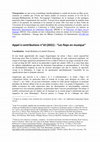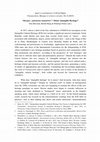Appel à contributions / Call for articles by Transposition. Musique et sciences sociales

Transposition est une revue scientifique interdisciplinaire à comité de lecture en libre accès, s... more Transposition est une revue scientifique interdisciplinaire à comité de lecture en libre accès, soutenue et coéditée par l'École des hautes études en sciences sociales et la Cité de la musique-Philharmonie de Paris. Envisageant l'importance de la musique et des pratiques musicales dans l'organisation des sociétés, Transposition entend questionner la manière dont celles-ci les pensent, les instituent et les mettent en scène. Elle veut ainsi se faire l'écho de l'ouverture de la musicologie aux autres disciplines des sciences humaines et sociales, tout en encourageant ces dernières à s'intéresser à l'objet musical. Transposition est indexée au Répertoire International de Littérature Musicale (RILM) et au Directory of Open Access Journals (DOAJ). Son contenu est mis à disposition selon les termes de la Licence Creative Commons Attribution-Partage dans les Mêmes Conditions 4.0 International (CC-BY-SA 4.0). Appel à contributions n°10 (2021)-"Les flops en musique" Coordination : Sarah Benhaïm et Lambert Dousson Si une étude approfondie des usages linguistiques du terme « flop » serait aujourd'hui bienvenue pour faire la lumière sur l'évolution historique de cette expression populaire, les corpus d'ouvrages numérisés permettent d'ores et déjà d'observer un usage croissant de celui-ci tout au long du XX e siècle et en particulier à partir des années 1960, et ce aussi bien dans les sphères anglophones que dans les domaines francophones et germanophones 1. Si le flop est abondamment employé au sein de secteurs artistiques tels que le cinéma, le spectacle vivant et la littérature, il s'agit ici de questionner spécifiquement l'ensemble de ses significations dans le domaine musical. Anglicisme qui renvoie à la « chute » et à l'« effondrement », le terme « flop » est couramment utilisé, en particulier dans le monde de la pop, pour désigner un échec, un « fiasco 2 », un « bide » ou un non-événement, comme la sortie passée inaperçue (et pourtant attendue) du dernier album d'un ou une artiste reconnu‧e mais « en panne d'inspiration ». La faible occurrence de cette expression dans les dictionnaires et encyclopédies contraste pourtant avec son caractère populaire, en particulier dans l'univers journalistique. De même, il semble curieusement que les études sur la musique ne se soient jusqu'à maintenant que peu emparées de cette thématique 3. Peut-on penser, à l'image de la « fabrique des tubes 1 D'après les résultats d'une recherche des occurrences du mot « flop » sur l'application linguistique Ngram Viewer. 2 Jean-Yves Jouannais rappelle dans les premières pages de L'Idiotie que le terme « fiasco » a été importé d'Italie par Stendhal dans un chapitre figurant parmi les Compléments posthumes ajoutés à l'édition de 1853 de De l'amour, pour désigner non pas tant la débandade, mais d'abord et surtout l'éjaculation précoce (JOUANNAIS

Transposition is an interdisciplinary peer-reviewed journal, supported and co-published by the Éc... more Transposition is an interdisciplinary peer-reviewed journal, supported and co-published by the École des hautes études en sciences sociales (EHESS) and the Cité de la musique-Philharmonie de Paris. Transposition considers music and sound research at the intersection of the humanities and social sciences, in particular through the exploration of cross-disciplinary themes. Addressing the significance of music in the understanding of human societies, the journal seeks to examine how societies conceive, establish and stage their musical, sonic and listening practices. Transposition promotes open research, publishing original articles, commentaries and reviews in open access under a Creative Commons license. As member of OpenEdition Journals, Transposition is indexed in the Répertoire International de Littérature Musicale (RILM) and the Directory of Open Access Journals (DOAJ). Call for papers No. 10 (2021)-"Flops in music" Editors: Sarah Benhaïm and Lambert Dousson While an in-depth study of linguistic usages of the term "flop" would, at this stage, be useful to shed light on the historical evolution of this vernacular expression, the corpora of digitised works already reveal increasing usage of the word "flop" throughout the twentieth century, particularly from the 1960s onward, not only in English-speaking spheres, but also in the French-and German-speaking domains. 1 While "flop" is widely used in artistic sectors such as film, the performing arts and literature, here we specifically examine its meanings in music. The English word "flop" has various meanings, including "drop" or "collapse"; as a noun, it is commonly used, especially in pop culture, to mean a failure, a "fiasco 2 ", a "bust" or non-event-like a highly-anticipated album release that falls flat, a well-known artist's latest work failing to live up to the expectations-and it is largely in this sense that it is borrowed in other languages. The expression's infrequency in dictionaries and encyclopaedias contrasts with its popularity, particularly in journalistic contexts, and, curiously, it seems that until now studies on music have largely overlooked this topic. 3 Like the "hit factory" analysed by United States 1 According to search results on the frequency of the word "flop" using the language analysis tool Ngram Viewer.

In 2017, almost a third of the files submitted to UNESCO for inscription on the Intangible Cultur... more In 2017, almost a third of the files submitted to UNESCO for inscription on the Intangible Cultural Heritage (ICH) lists include a significant musical component. Greek Rebetiko could thereby join more than seventy listed forms of "music" often associated with celebrations, dances, poetry and knowhow -such as the Tango of Rio de la Plata, Shashmaqam of Central Asia, Brazilian Samba de Roda, and Tar craftsmanship and performance in Azerbaidjan. Applications have poured in since the 2006 entry into force of the International Convention for the Safeguarding of ICH, which established a new heritage paradigm based on practices and communities rather than monuments and artefacts 1 , according to the perspective of "new heritages" and their aim to cultivate more open and participatory practices 2 . Outside the realm of the United Nations, this new category of "intangible heritage" has infused into the vocabulary and approaches taken by national registers, and into local cultural policy, heritagerelated and museum activities, and the general discourse, generating a variety of modes of appropriation and contention. Considering the farreaching implications, this issue of Transposition aims to explore the specific case of music in the domain of "intangible cultural heritage", both within and beyond the framework used by UNESCO.
Sommaires des numéros parus by Transposition. Musique et sciences sociales
Transposition. Musique et sciences sociales, 2021
Dossier complet / Full issue: https://journals.openedition.org/transposition/5467
Transposition. Musique et sciences sociales, 2020
by Transposition. Musique et sciences sociales, Elsa Broclain, Maria José Barriga, Lucia Campos, Séverine Gabry-Thienpont, Dominique Cyrille, Pierre-Eugene Sitchet, PhD aka Gino Sitson, Pedro Félix, rob casey, and Samuel Llano
Le subventionnement des concerts symphoniques dans les départements français entre 1861 et 1969 [... more Le subventionnement des concerts symphoniques dans les départements français entre 1861 et 1969 [Texte intégral] Une préhistoire de la politique musicale de l'État et une géographie de la France musicale Chloé Dos Reis Les premières éditions de pièces de clavecin en France, oeuvres musicales et économie [Texte intégral]

Uploads
Appel à contributions / Call for articles by Transposition. Musique et sciences sociales
Sommaires des numéros parus by Transposition. Musique et sciences sociales